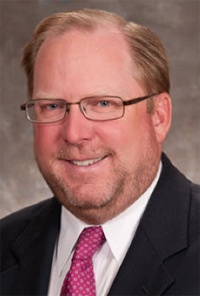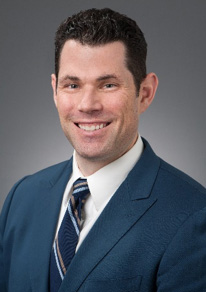By JOHN STEWART AND CASEY FLAHERTY
The faith we place in our future selves is near limitless. The me-of-tomorrow is going to be more disciplined and diligent than the me-of-today. Getting to the gym. More sleep. Acquiring a new skill. We often laugh at our prior selves for their hubris. That is, unless they have somehow managed to lock us into a commitment that, while a fine idea in the abstract, is not really what we would prefer to do with our time at the present moment.
The Odysseus option is a way to harness our rosy view of our future selves. We know we should pursue something. But we also know that we are likely to find excuses in the moment not to do so. So we precommit. We sign up, make plans with our peers, place friendly wagers, impose mandates, etc. We volunteer for social pressure and consequences. Often times, an important part of being intrinsically motivated is finding ways to introduce extrinsic motivation to drive adherence.

John Stewart.
Mandatory Continuing Legal Education is a form of precommitment. We know that being a profession of lifetime learners is vital for properly serving the public. But we also know that, as individuals, we often struggle to carve out time to learn, especially on topics outside our substantive expertise and comfort zone. There are too many competing demands for our attention. In an information economy, attention is the scarcest commodity. So we collectively precommit to a minimum amount of time devoted to formal learning.
We set aside time because time is finite. And time is an important element in learning. But time is a poor proxy for learning. The internet, that great democratizer of knowledge, is also Exhibit A for the proposition that vast quantities of time can be expended without any learning taking place. The internet contains multitudes—the sublime, the stimulating, and the enlightening alongside the trivial, the frivolous, and the venal. The latter outnumbers the former by several orders of magnitude. And all MCLE participants now sit there with the internet in the palms of their hands (when live) or on an adjacent browser tab (when playing videos) while someone tries to talk at them about the kind of topics that qualify for MCLE. The regular victor in that battle for attention is unsurprising.
And the distraction need not be frivolous. It can simply be work. Again, the theory underpinning MCLE is that lawyers are so on-task that we must precommit to set aside time to stay current. But our work now accompanies us into presentations or, even more seductively, is right there on our computer while we ‘watch’ an MCLE video. The rules rarely require that lawyers engage with MCLE material. The requirement is simply physical or virtual presence. Engagement is optional. Competence-based MCLE is therefore another degree of precommitment because it ties credits to engagement rather than time.
There is a case to be made for MCLE. There is case to be made for competence-based MCLE. But neither of them quite explain (a) why The Florida Bar is making technology competence a mandatory topic for a minimum of 3 hours of MCLE or (b) why The Florida Bar is also working to provide optional competence-based training.
That technology is now central to the delivery of legal services has gone from heresy to orthodoxy in record time. Passing few think the profession can put the genie back in the bottle on e-filing, e-service, and e-discovery, let alone email, e-commerce, e-signatures, etc. To operate in the modern world, lawyers have to be of the modern world. Making tech competence an explicit ethical duty furthers our efforts to fulfill our mandate to serve the public interest.
Reinforcing that ethical duty with an express MCLE requirement is a recognition that keeping up with technology demands more than a vague directive. The purported user-friendliness of modern technology obscures that much of what lawyers need to do and know is neither obvious nor easy. This is particularly true with respect to maintaining the confidentiality of client information, which receives special emphasis in Florida’s new comment (PDF) covering tech competence. Often, the convenience of digital dissemination is inversely related to the safeguards on accessibility.
Supporting the MCLE requirement by experimenting with competence-based options is, in part, about recognizing that lecture-style instruction may not be the best way to impart the practical skills attendant to tech competence. But it is also about expanding choice and self-direction. The new MCLE requirement adds more structure. There is, however, no reason why that structure needs to be rigid. Flexibility can be deliberately engineered.
Certainly, three hours spread over three years is just a drop in the bucket. Many lawyers should spend that, or more, every month keeping abreast of changes in technological landscape and understanding the associated risks for their clients and their practice. Still, it is a start. Explained previously, as the island of knowledge expands, so do the shores of recognizable ignorance. The new requirement is intended to get lawyers past the point where they don’t know what they don’t know. The three hours are not the finish line—there is no finish line—but a mechanism to overcome inertia and get lawyers moving in the right direction.
We believe that technologically enabled lawyers will better serve their clients and themselves. For their clients, they can simultaneously improve quality, speed, and cost-effectiveness. For themselves, lawyers can reduce time spent working while increasing their yield.

Casey Flaherty.
According to a report from Clio, most lawyers’ utilization rates are well below 50 percent with realization rates hovering around 80 percent. There is an important interplay between utilization/realization and cost. Lawyers who get paid for only a small percentage of their time are inclined to charge more for it in order to make a living. We are stuck in a low-usage/high-cost equilibrium. Technology has the potential to be one piece of the complicated puzzle that moves more lawyers toward a higher usage/lower cost equilibrium, and it is therefore one aspect of addressing the access-to-justice crisis.
The Florida Bar is proud to be at the vanguard on these issues, in part, for justifiably selfish reasons. For certain kinds of legal work, electronic communication has decoupled retention and geography. That is, there are certain types of legal work that can be done anywhere. We want it done in Florida not only because our technologically enabled lawyers are excellent, fast, and affordable but because clients have credible evidence that, relative to lawyers in other states, Florida lawyers are committed to staying excellent, fast, and affordable. Being the first mover on technology MCLE was partially motivated by giving Florida lawyers a competitive advantage. So while we encourage our sister states to follow our lead, we won’t be upset if you take whatever time you need to study the issue first.
John Stewart is on the Florida Bar Board of Governors and was Chair of the Technology Committee of Vision 2016. John is also a partner at Rossway Swan Tierney Barry Lacey & Oliver. Casey Flaherty is of counsel and director of client value at Haight Brown & Bonesteel and serves on the advisory board of Nextlaw Labs. Casey is the founder of the legal operations consultancy Procertas and creator of the Legal Technology Assessment.